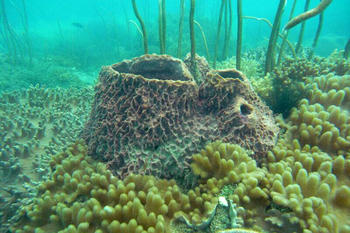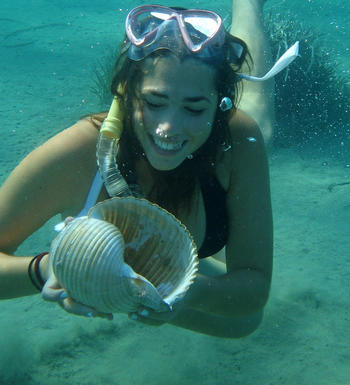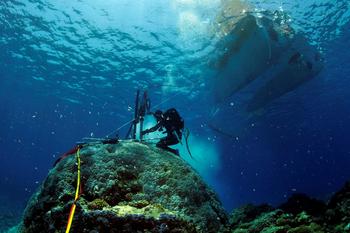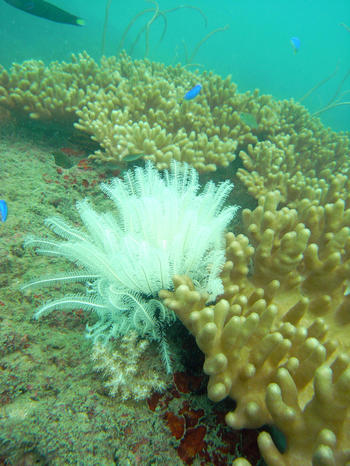Diving into Research
Christina Braoun, a student enrolled in a master’s degree program in biology, travels to Borneo with a team of researchers to study corals.
Oct 05, 2016
Coral reefs are of great importance for the ecosystems of the oceans, and they are fascinatingly beautiful.
Image Credit: Jennifer McIlwain/Curtin University
Christina Braoun diving for coral in Greece.
Image Credit: privat
Dr. Jens Zinke has drilled in many coral reefs in order to reconstruct the climate, shown here along the coast of Australia. This fall he is taking samples from the coral in Borneo.
Image Credit: Eric Watson/AIMS (Australien)
Many corals get their energy through photosynthesis, but stranded sediments can prevent sunlight from penetrating to the coral.
Image Credit: Jennifer McIlwain/Curtin University
Coral reefs are beautiful – and extremely important from an ecological standpoint. Christina Braoun, a student enrolled in the master’s degree program in Biodiversity, Evolution and Ecology at Freie Universität, plans to study them up close and personal over the next few weeks.
In just a few days, she will be joining a team of biologists and geologists who are traveling to the Southeast Asian island of Borneo to study the coral reefs of Miri-Sibuti National Park there. While the geologists, headed by paleontologist Jens Zinke of Freie Universität, will use the coral cores for climate research, Braoun plans to study the health of the reefs themselves.
Ever since she gave a presentation on Australia’s Great Barrier Reef during her undergraduate program, Braoun has known that she wanted to become a marine biologist. “I realized at that point just how sensitive coral reefs in the oceans are,” she says. “We need to understand these important ecosystems better so that we can protect them.”
Braoun explains that the area around Borneo is especially hard-hit by global warming and by weather patterns such as El Niño and La Niña. However, preliminary investigations have shown that less of the coral in the ocean around Borneo is dying than researchers had feared. Now the team wants to find out why.
Braoun will be part of an international team of researchers from Australia, Malaysia, and Germany. Some of them will be charting the sea floor, while others are to count the corals and identify the different species of coral. Braoun herself will partner with an Australian researcher, diving to depths of as much as ten meters to assess the corals’ health. She plans to work in both clear water and water that is turbid with sediment, measuring various environmental factors in both places, from temperature and salinity to sedimentation rates. The researchers will take samples to identify the specific species of coral.
Deforestation Poses Threat to Coral Reefs
In Borneo, the biologists will study how human activity affects the fragile coral reef ecosystem. “The island has seen extensive deforestation,” Braoun explains. “As a result, the rivers carry more and more soil and agricultural pesticides into the sea, and they form deposits on the reefs.” These sediments can be deadly to corals, blocking sunlight and thus impeding the photosynthesis on which many corals depend. Some corals are evidently better able to cope with these changes than others, Braoun says; adaptable species are able to do without photosynthesis, drawing nutrients from the sediment instead.
Braoun had been looking for an opportunity to participate in research on corals for a long time. One day, she got a tip that she should ask at the Department of Earth Sciences at Freie Universität. Jens Zinke, a climate researcher who has a doctorate in geochemistry, started work there in April of this year. He has been working on corals for over 20 years now. He offered Braoun a spot on the research trip to Borneo.
Corals Document Climate Change
Zinke views the reefs as highly important to work in his field, since they grow over decades and even centuries, serving as repositories of valuable information on the past. Under water, he drills into them to reach the “skeleton,” taking core samples. Back in the lab, he analyzes the cores’ chemical composition, which allows him to trace the path of climate change. His analyses have shown that climate change began earlier than scientists previously thought. As far back as the very dawn of the Industrial Revolution, 180 years ago, ocean temperatures rose noticeably, as he wrote in an article published in Nature last month.
The results of the research trip to Borneo will form the basis for Braoun’s master thesis. Zinke thinks it is great for students to be involved in field research even before they finish their degree programs. “When you pursue a research project of your own, you’re more involved than if a topic is assigned to you,” he says. Braoun, for her part, is looking forward to diving. “I grew up on a Greek island,” says Braoun, who is now 24. “When I was really little, I could swim better than I could walk,” she explains, adding that even back then, she developed a great curiosity about everything found in the sea.
Further Information
Biofilm Evening: Christina Braoun and Jens Zinke will report on their research trip during a film screening.
Time and Location
- Tuesday, November 1, 2016, 7 p.m.
- Main Lecture Hall in the Zoology Building, Königin-Luise-Str. 1-3
- More information will be posted on Twitter.
Link
There is a video documentation on YouTube about the research project in the Miri-Sibuti Coral Reef National Park.




